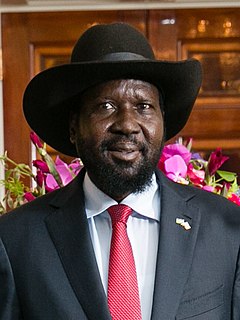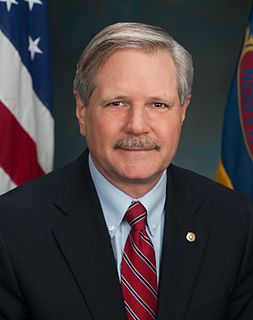A Quote by Noam Chomsky
We're supposed to believe that oil had nothing to do with it, that if Iraq were exporting pickles or jelly and the center of world oil production were in the South Pacific that the United States would've liberated them anyway. It has nothing to do with the oil, what a crass idea. Anyone with their head screwed on knows that that can't be true.
Related Quotes
We'd be better off if the whole purpose of the adventure in Iraq was, say, to protect Israel or to protect the flow of oil to America and keep it at a reasonable price and try to get some more control. If it was about oil, going into Iraq, I guess, could have made sense. But at a certain point, when the insurgency began and we were in real trouble, there would have been some awareness that we were going to jeopardize the oil.
There's a huge misconception that it's all about the oil, and the truth is there's actually not much oil left in Abyei. The misperception arose because when the peace agreement was signed in 2005, Abyei accounted for a quarter of Sudan's oil production. Since then, the Permanent Court of Arbitration in The Hague defined major oil fields to lie outside Abyei. They're in the north now, not even up for grabs, and they account for one percent of the oil in Sudan. The idea that it's "oil-rich Abyei" is out of date.
Even if we were to sign peace today, the economic conditions in our country would not improve automatically because it will take some time to reach the level of oil production before the war and the oil prices are likely to remain low for some time as the supply of oil in the world is high and demand is low.
I've been saying for a long time, and I think you'll agree, because I said it to you once, had we taken the oil - and we should have taken the oil - ISIS would not have been able to form either, because the oil was their primary source of income. And now they have the oil all over the place, including the oil - a lot of the oil in Libya, which was another one of her disasters.
Speculation in oil stock companies was another great evil ... From the first, oil men had to contend with wild fluctuations in the price of oil. ... Such fluctuations were the natural element of the speculator, and he came early, buying in quantities and holding in storage tanks for higher prices. If enough oil was held, or if the production fell off, up went the price, only to be knocked down by the throwing of great quantities of stocks on the market.
The irony of environmental opposition to the Keystone XL project is that stopping the pipeline to the U.S. will not stop production in the oil sands of Canada. Instead of coming to the United States, the oil will still be produced and shipped by rail or a pipeline similar to the Keystone XL to Canada's Pacific Coast.




































